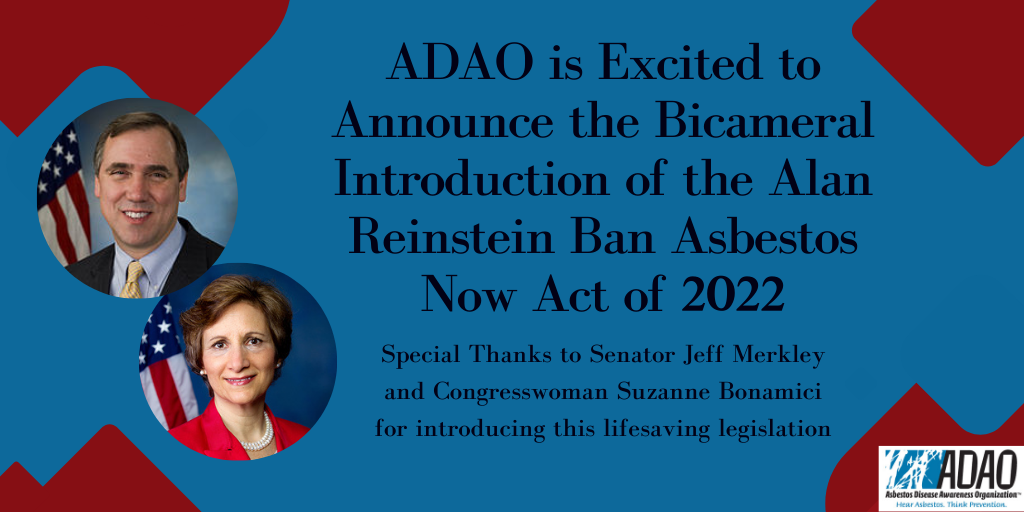Posted on May 20, 2022

The Asbestos Disease Awareness Organization (ADAO), an independent nonprofit dedicated to preventing asbestos exposure, is excited to announce that on May 17, 2022, Senator Jeff Merkley (D-OR) and Representative Suzanne Bonamici (D-OR) introduced the Alan Reinstein Ban Asbestos Now (ARBAN) Act of 2022. Celebrate this important legislative step with us by watching and sharing Senator Merkley’s incredible video, in which he announces the introduction and explains why the ban for all fibers and uses is needed.
Early ARBAN supporters include: Asbestos Disease Awareness Organization (ADAO), American Public Health Association (APHA), International Association of Firefighters (IAFF), Environmental Protection Network (EPN), Safer Chemicals, Healthy Families (SCHF), United States Public Interest Research Group, (PIRG), Center for Environmental Health (CEH), Environmental Working Group (EWG), Collegium Ramazzini, Environmental Information Association (EIA), Hazards (UK), Less Cancer, and Brazilian Association of People Exposed to Asbestos (ABREA).
The Senate Committee on Environment and Public Works Subcommittee on Chemical Safety, Waste Management, Environmental Justice, and Regulatory Oversight will hold a hearing entitled, “A Legislative Hearing on S. 4244, Legislation to Prohibit the Manufacture, Processing, and Distribution in Commerce of Asbestos” on June 9, 2022. ADAO is honored to be asked to testify at this important legislative hearing to advance prevention efforts to protect public health from asbestos.
You can find the top 10 facts about ARBAN below.
The Alan Reinstein Ban Asbestos Now Act (S. 4244, H.R. 7810) is comprehensive legislation that will:
- Prohibit the importation and commercial use of all six asbestos fibers (chrysotile, crocidolite (riebeckite), amosite (cummingtonite-grunerite), anthophyllite, tremolite, and actinolite) as well as Libby Amphibole, winchite, and richerite.
- Transition plants in the chlor-alkali industry using asbestos diaphragms to non-asbestos technology within two years.
- Establish mandatory asbestos reporting obligations for companies importing and using asbestos.
- Develop an educational outreach program to support full compliance with ARBAN.
The chlor-alkali industry is the only importer of raw chrysotile asbestos, which it uses to manufacture industrial chlorine and caustic soda. Since 2016, the chlor-alkali industry has decreased the number of plants that depend on using asbestos diaphragms from 17 to 9, a transition that demonstrates how non-asbestos technology is not only feasible but makes good business sense.
In contrast to EPA’s proposed rule-making, ARBAN would permanently close the door to all importation and commercial use of raw asbestos and asbestos-containing products, not just for chrysotile but for all six asbestos fibers and the Libby Amphibole, and for all uses. As an act of Congress, ARBAN will avoid time-consuming and unproductive litigation over the pending EPA rule-making that could delay protecting Americans from the risks of asbestos exposure.
ADAO applauds Senator Jeff Merkley and Representative Suzanne Bonamici for their unwavering dedication, leadership and perseverance to protect Americans from deadly asbestos. The Alan Reinstein Ban Asbestos Now Act of 2022 builds on previous landmark legislative steps and successes, and deserves to get the full attention of Congress and fast tracked to President Biden’s desk for immediate enactment. U.S. imports this year have already exceeded 2021 asbestos imports. It is crucial that we pass this life saving legislation, and we look forward to the day the risk of asbestos exposure is a thing of the past.
Top Ten Asbestos and Alan Reinstein Ban Asbestos Now (ARBAN) Act of 2022 Facts are:
- An estimated 40,000 Americans die each year from preventable asbestos-caused diseases.
- There is no safe level of asbestos exposure.
- Nearly 70 countries have banned asbestos. It’s time the United States did the same.
- In the first quarter of 2022, raw asbestos imports exceeded the total amount of asbestos imported in 2021, 114 metric ton and 100 metric tons respectively.
- The chlor-alkali industry is the only importer and user of raw chrysotile asbestos, which they use to manufacture chlorine and caustic soda. More than 75 percent of the industry’s plants in the US use non-asbestos. technology, which confirms they can, have, and continue to transition to safer and more sustainable methods.
- EPA’s Part 1 risk evaluation for chrysotile asbestos finds that chlor-alkali asbestos diaphragms and five other ongoing conditions of use pose an unreasonable risk to human health.
- EPA’s Part 1 proposed rule will only ban one fiber, chrysotile asbestos, for six conditions of use. There are five other deadly fibers, and other conditions of use are ongoing or may be introduced. ARBAN would impose a comprehensive ban on all fibers and uses.
- ARBAN only applies to commercially mined and used asbestos, not asbestos contaminants in other mineral formations, and would not impact the US mining industry.
- As an amendment to the Toxic Substances Control Act, ARBAN’s scope extends only to TSCA-regulated chemical substances, not personal care products or cosmetics within the jurisdiction of the Food and Drug Administration.
- As an act of Congress, ARBAN will avoid time-consuming and unproductive litigation that could delay EPA’s pending Part 1 rulemaking. Legislation is the only way to fully and permanently prevent unnecessary exposure and deaths from asbestos.
Using the information listed above, we would like to encourage you to write your congress members in both the House and Senate to implore them to sign on to the Alan Reinstein Ban Asbestos Now Act of 2022 and save the lives of their constituents.
Thank you for your continued support. Together, we are making change possible.
Linda Reinstein
Social Networks
